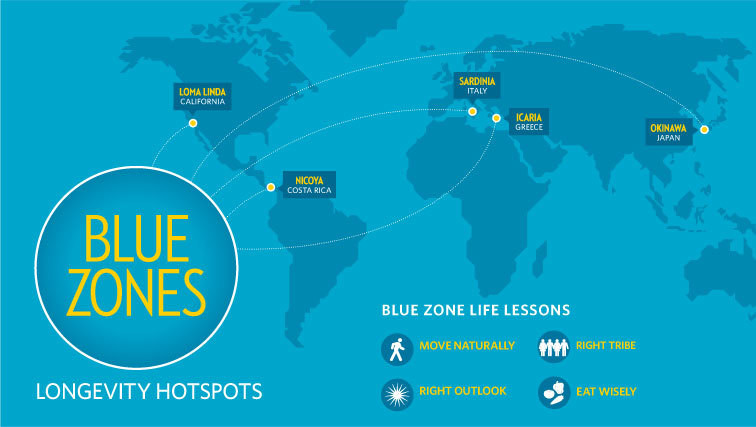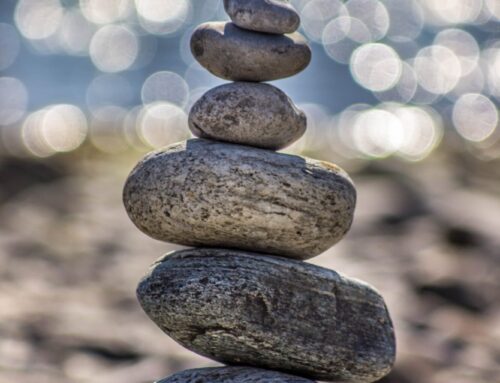Although 2020 in no way panned out the way I had hoped, looking back at it, I realize good things did happen.
Yes, my wedding, honeymoon and several family get-togethers got cancelled, but on the plus side, my health and wellbeing was boosted by transitioning to a largely plant-based diet, and taking up cycling in London has been thrilling and fabulous exercise.
In 2020 I continued my daily morning practise of reading books for 30 min before checking my emails, and I thought I’ll share the main learnings of one book that particularly inspired me:
The Blue Zones: 9 Lessons for Living Longer
I love that the books’ insights and recommendations on happiness are based on scientific findings, rather than on hunches or guesswork. With the help of National Geographic and a team of anthropologists, demographers and statisticians, Dan Buettner has identified the 5 areas in the world where people live the longest (and disease-free) lives.
These areas, called Blue Zones, are in Okinawa (Japan), Sardinia (Italy), Nicoya (Costa Rica), Ikaria (Greece) and Loma Linda (California). Over the span of 5 years Dan’s team interviewed the inhabitants of these 5 Blue Zones, in order to find the common denominators for longevity.
Here are the Top 9 – I’d love for you to have a read through to see if focusing on 1-2 of them might improve your life in 2021?
- Move Naturally
The world’s longest-lived people don’t pump iron, or join gyms. Instead, they live in environments that constantly nudge them into moving. They grow gardens and don’t have mechanical conveniences for house and yard work.
- Purpose
The Okinawans call it “Ikigai” and the Nicoyans call it “plan de vida;” for both it translates to “why I wake up in the morning.” Knowing your sense of purpose is worth up to seven years of extra life expectancy.
- Down Shift
Even people in the Blue Zones experience stress. Stress leads to chronic inflammation, associated with every major age-related disease. What the world’s longest-lived people have that we don’t are routines to shed that stress. Okinawans take a few moments each day to remember their ancestors, Adventists pray, Ikarians take a nap and Sardinians do happy hour.
- 80% Rule
“Hara hachi bu” – the Okinawan, 2500-year old Confucian mantra said before meals reminds them to stop eating when their stomachs are 80 percent full. The 20% gap between not being hungry and feeling full could be the difference between losing weight or gaining it. People in the blue zones eat their smallest meal in the late afternoon or early evening and then they don’t eat any more the rest of the day.
- Plant Slant
Beans, including fava, black, soy and lentils, are the cornerstone of most centenarian diets. Meat—mostly pork—is eaten on average only five times per month. Serving sizes are 90-120g, about the size of a deck of cards.
- Wine @ 5
People in all blue zones (except Adventists) drink alcohol moderately and regularly. Moderate drinkers outlive non-drinkers. The trick is to drink 1-2 glasses per day (preferably Sardinian Cannonau wine), with friends and/or with food. And no, you can’t save up all week and have 14 drinks on Saturday.
- Belong
All but five of the 263 centenarians we interviewed belonged to some faith-based community. Denomination doesn’t seem to matter. Research shows that attending faith-based services four times per month will add 4-14 years of life expectancy.
- Loved Ones First
Successful centenarians in the blue zones put their families first. This means keeping aging parents and grandparents nearby or in the home (It lowers disease and mortality rates of children in the home too.). They commit to a life partner (which can add up to 3 years of life expectancy) and invest in their children with time and love (They’ll be more likely to care for you when the time comes).
- Right Tribe
The world’s longest lived people chose–or were born into–social circles that supported healthy behaviors, Okinawans created ”moais”–groups of five friends that committed to each other for life. Research from the Framingham Studies shows that smoking, obesity, happiness, and even loneliness are contagious. So the social networks of long-lived people have favorably shaped their health behaviors.
I’m curious as to which one of these pop out to you?
Focusing on which one or two would make your life a little bit better in 2021?
If you’d like my support to improve your life in any of these areas – for example by discovering a career direction which gives you a greater sense of purpose, then just reply to this email and we’ll find a time to talk.
I have made it my mission to help even more people in 2021 than I helped in 2020, so I’d be delighted to listen to your challenges and discuss an exciting path forward with you.
I wish you a wonderful 2021, may all your dreams and aspirations come true,
Best, Christine







Leave A Comment